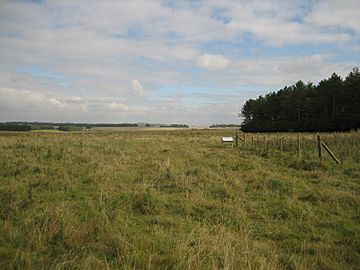Stonehenge Landscape facts for kids
| UNESCO World Heritage Site | |
|---|---|

The western end of the Stonehenge Cursus, part of the National Trust Stonehenge Landscape
|
|
| Location | Wiltshire, England, United Kingdom |
| Part of | "Stonehenge and Associated Monuments" part of Stonehenge, Avebury and Associated Sites |
| Criteria | Cultural: (i)(ii)(iii) |
| Inscription | 1986 (10th Session) |
| Extensions | 2008 |
| Website | https://www.nationaltrust.org.uk/stonehenge-landscape |
The Stonehenge Landscape is a large area of land in Wiltshire, England. It is managed by The National Trust, a charity that protects important places. This special area surrounds the famous ancient monument of Stonehenge. The landscape covers about 2,100 acres (850 hectares) on Salisbury Plain.
Stonehenge itself is looked after by English Heritage. It was given to the nation in 1918 by Cecil and Mary Chubb. They had bought it just three years before. The Stonehenge Landscape is a very important part of the wider Stonehenge World Heritage Site. This means it is recognized globally for its special history and culture.
Contents
What Is the Stonehenge Landscape?
The Stonehenge Landscape is a huge area of land that surrounds the famous stone circle. It's much more than just the stones themselves! This land is owned by The National Trust. It helps protect the ancient monument and the many other historical features around it.
Why Is This Land Important?
The land around Stonehenge is very important for several reasons. It helps protect the views and setting of the stone circle. It also contains many other ancient sites. These include burial mounds, earthworks, and other prehistoric structures. Protecting this land ensures that future generations can enjoy and learn about this amazing historical area.
How the Land Was Protected
Much of the land around Stonehenge was bought in 1927. This happened after people raised money to stop new buildings from being built too close to the monument. The land was then given to The National Trust. This made sure it would be kept safe for everyone to enjoy.
Soon after, old buildings like cottages and a World War I airfield were removed. This helped to restore the area to a more natural state. Later, in the early 2000s, the Trust bought even more land. This expanded the protected area even further.
Ancient Sites in the Landscape
The land managed by The National Trust makes up almost one-third of the Stonehenge World Heritage Site. It contains nearly 400 ancient monuments. Most of these are protected by law.
These monuments include:
- The Stonehenge Cursus: A very long, ancient earthwork.
- The Avenue: An ancient path leading to Stonehenge.
- Woodhenge: A timber circle that was once similar to Stonehenge.
- Durrington Walls: A large ancient settlement.
- Many barrows: These are ancient burial mounds.
The area also has some interesting tree clumps called the Nile Clumps. These large groups of trees on farmland are said to represent ships from the Battle of the Nile. They were supposedly planted as a memorial to Horatio Nelson, a famous British admiral.
Protecting the Environment
In the 1970s and 1980s, the Stonehenge Landscape was used for the Stonehenge Free Festival. However, this festival caused damage to some of the ancient monuments. Because of this, the festival was stopped in 1985.
Today, there is a big project to help the land return to its natural state. About 340 hectares (840 acres) of the land are being turned back into chalk grassland. This is one of the largest projects of its kind in Europe. This change allows more public access to the area. It also helps protect the local wildlife and plants. As of June 2020, about 112 hectares (277 acres) have already been restored. This land is used for public access and for animals to graze.
Images for kids


